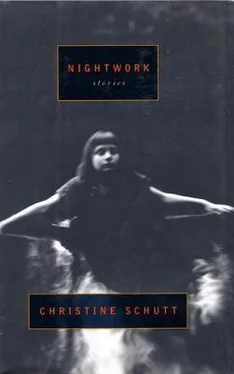Do you know what time it is? If she could only ask her brother again — do you have any idea what time it is? Margaret folded laundry, pinching at her collar bath towels still warm yet coarse against her chin. What else was there to do? she asked. Margaret told the girls, “I waited up for him at night. I washed the floors.” From upstairs came Martin’s calling, “Margaret, look at the time!”
Four, five, six in the morning when the sky pearled and others, early wakeful, moved, she guessed as she did, to hoard the spangled outlook, Margaret did not care by then that her brother’s bed was empty. “Not one of you girls in it,” she said, “and I bet you thought I didn’t know, but he told me.”
On the nights he did come home, he spoke of the girls. Crouched in the collapse of his bed, he gave his version of the girls to Margaret. How their hands brushed over the new hair under his arms — as though it were high grass and they walking through the field of him. “My brother,” she said, “he told me what happened some nights after you abandoned the abandoned embassy.” The sucked-down candies he proffered on his tongue. The brother was talking and Martin was calling “Margaret!”—when who was this Margaret? She sometimes forgot herself with the boy — the boy huffing on his watch and scolding, “Fuck Martin! Margaret, it’s me who needs you.”
She told the girls, “I had no babies of my own.”
And another time, when they would speak to her of him, she asked the girls, “He did tell you about us, didn’t he?”
“Yes, yes, yes, yes, yes,” the girls said, which made her wonder then what her brother might have said about her.
He might have said Margaret was his mother, even when their own was alive and making a living at night. He might have described a sister of stout and rounded back, despite that she was young; she was working. She was working dirty jobs in dirty clothes — for him. For him she was broiling cheap cuts done for dinner. For him she bargained; for him she wrote: “Please excuse this lateness. He wasn’t feeling very well. He didn’t mean it. He didn’t know. He didn’t understand.”
The ways she thought to love him! Draping towels over his bent head at the mouth of the steaming pot — to help him breathe when he was croupy — such was her mothering. Margaret was the person he thought first to see when they picked him up for thieving. She never made him promise to quit his ways, but listened to him promise he would try to be better — especially around Martin — no more stripping through the kitchen, drying himself with his shirt. He would not cough when Martin was talking or in the man’s presence snipe at her for money. The rinds and open cartons behind the milk — sometimes even a plate, fork and knife crossed over it — empty dispensers and unexpected bills, late-night lockouts and bust-up girls: There would be, the boy promised her, no more surprises.
Was that how he thought to tell the girls it was among them — a sister, a brother, a brother-in-law — in a strip of rooms made smaller if the brother had company?
Because, she told the girls, she was not so old as to forget some sensations; she recognized the knock of the bed and the yeasty smell of yearning. Her brother’s broken, coaxing voice — she knew the sound of that: his please and won’t and will you. The sore places near his lips and his lips, so split and glossy, were some of what it was about him — must have been — that made the girls say yes, grind their heels against his back, ask, “Doesn’t this hurt, what I am doing?”
“No, no, no, no, no,” the girls insisted. “We were not like that,” and they didn’t call her by her married name, but spoke familiarly. “Margaret,” they said, and they described her brother as sullen. They had seen him elbow clingy girls, seen him shawled against the chills, seen him counting his money. The way he left the bathroom with his beery piss unflushed in the unseated bowl, the girls laughed to tell it, although Margaret had seen it, too. Suddenly, the brother was leaving his mark in the rooms through which he passed.
“No,” she said. “He wasn’t such a beast as that.” He spent time uptown on the high grounds of the garden with the scrolly gates. “He could be sweet,” Margaret told the girls. “He was not indifferent to his surroundings.” He looked at trees, at how in spring the new leaves were so many of them spiked. He had his places — that much she said she knew. He sometimes went for drugs. “But, Lord,” she said, and looked hard at the girls, “we all of us sometimes need it.”
The grassy smell of him come home on an evening when the sky stayed white, Margaret remembered him with blades of grass pressed against his back and with muddy, open shoes. He brought home a smell of something she had forgotten, with Martin in the broad bed crying out, “Margaret!”
Of course, there were resentments, she explained, Martin’s version of things, what he called “assaults by that punk-mouthed brother of yours,” then added, “Yours the family with the fucked-up genes — lucky you can’t pass them along.”
“My fault,” Margaret said to the girls, hands cupped between her legs. “My fault he was my brother. I could not scold him. I liked to kiss him instead. I liked to rub my thumb along his front teeth, sit in his room and watch him sleep.” In sleep, his body was newly heavy and unmarked — breath fluttering the hollow of his neck. She said, “I was meant to see him, but not like that.”
“No, no, no, no, no,” Margaret cried, but when the girls appeared confused, she said, “Remember who saw him last.”
Late night or early morning, the hallway narrowed to a tunnel in the light from the end where he stood. He was returned but about to leave. His loose clothes undone confused her, but his sideways moves she understood. She had experienced before the unexpected charge of his unexpected smile, the hands lifted as in blessing: good-bye, good-bye!
But wait!
She had been waiting for him; she was awake, brushing aside other versions of his story — the one with the coroner’s instruments or the one where the heart gave out softly, and she pointed to that place on herself.
“My brother’s heart,” she told the girls. “I have heard its tricked beat. I have kept him company here,” Margaret said, and she opened the door for the girls to see his bedroom, the sheeted windows and the cutouts, things tossed, tented or on a tilt — in some ways just a boy’s room, no matter what was written on the wall. Impossible to make out anyway, his aggressive urban scrawl, his tag — whatever was his name — he wrote it where she walked from work past the diplomatic row, the promenade, the padlocked buildings. His bullying design was everywhere she looked.
His face, too, his wounded face — the bruised hollows of his eyes and his eyes so thickly lashed and sleepy — was the first version of his face Margaret saw. Here the skin’s imperfections, summer-oiled and over-wrought, were more pronounced than in the colder seasons when confronted with the smallness of his face behind a scarf. Outside, or on the way outside, the brother’s skin was close in winter, blown clear, cheeks a wind-scratched rouge. Yet she did not move to touch that face or the others that occurred to her out of order but up-to-date. Margaret told the girls, “Of the little boy he was, I remember less and less.”
A swatch of baby hair — shades lighter — and the slatted cage that was his chest, veiny threading everywhere.
Nails soft enough to bite off.
A new body very clean.
Shoes.
Hands again.
The sweated valleys between his fingers, his fingers ringed at the knuckles — and then not — but squaring at the ends to an older boy’s hands, drumming the kitchen counter.
Читать дальше












